Table of Contents
ToggleA Story of Two Boys: One Becoming, One Returning
Songkran moved through the apartment literally on tiptoes, barefoot, careful not to let the peace of the morning break. He reached for Leonard’s favorite ceramic teapot — the one with the faint chip near the spout that Leonard once claimed gave it character, as if flaws were what made something worth keeping.
As he poured the oolong tea, in the rising steam he caught the musky, woody scent — with a trace of some unnamed note he could never quite place — lingering faintly on his own skin. Leonard’s cologne, left behind from the night before.
He closed his eyes, breathed in slowly. He wished the scent would stay with him all day, just a little longer. So Leonard would feel closer.
He carried the teapot on a brass tray with both hands and moved through the doors as though memory itself paved each step.
Leonard was still in a deep sleep.
He lay on the floor mattress, turned slightly toward the veranda, the linen sheet resting just below his waist. His hairy chest — bare, unguarded — rose and fell with slow breath. The morning sun, breaking through the rainy clouds, slipped in quietly and touched the edge of Leonard’s face. It lit the lines beneath his eyes and etched golden streaks across his tanned skin — soft creases, sculpted by time, which Songkran had once traced with his fingertip, lovingly.
Songkran knelt beside him, slowly lowering the tray to the wooden floor. He didn’t want to wake Leonard. His gestures were graceful, oozing with his tender youthfulness, like a dancer in motion. As if moving slowly enough might slow time itself.
Songkran sat there quietly. His skin was smooth, almost luminous in the soft light, and there was something delicate, almost unformed, about the way he folded into stillness — as if he hadn’t yet realized the beauty he carried, or the ache it might leave in someone else.
On the other hand, if masculinity were a man, Leonard would be it.
Leonard had the kind of good looks that could’ve belonged on magazine covers — the sculpted jawlines, grey-streaked hair, presence like a sage — but for Songkran, it was something deeper. A kind of maturity shaped by silence and sorrow, something aged and earned.
Songkran was spellbound.
Something inside him felt whole.
And yet, something caught in his throat — a pain, a despair.
Where the Hurt First Learned to Hide
Songkran had grown up in a narrow house with a rusted gate, raised by a mother who worked two jobs and never once complained. She was soft in her speech but sharp in her eyes — the kind of woman who loved fiercely and asked for nothing.
His father was a photograph. There were no fights. No tragic departure. Just a slow erasure. One day, his father left. Just like that. His name faded from the air until even his shadow was a distant guess.
They didn’t talk about his father. Not because it was forbidden — but because it was fragile. Like a glass left too close to the edge. Songkran never cried about it. He told himself there was nothing to cry over. He had his mother. He had school. He had music, art and friends — a world full of things to keep his little heart busy as a curious young boy.
But still, something had been left unfinished. A door left ajar inside him.
He had never learned how to be held — not properly. Not without guilt or tension. Not without shrinking himself first.
The neighbors thought he was happy and healthy. Teachers called him well-mannered. But inside, there were storms. Storms only the pillow knew.
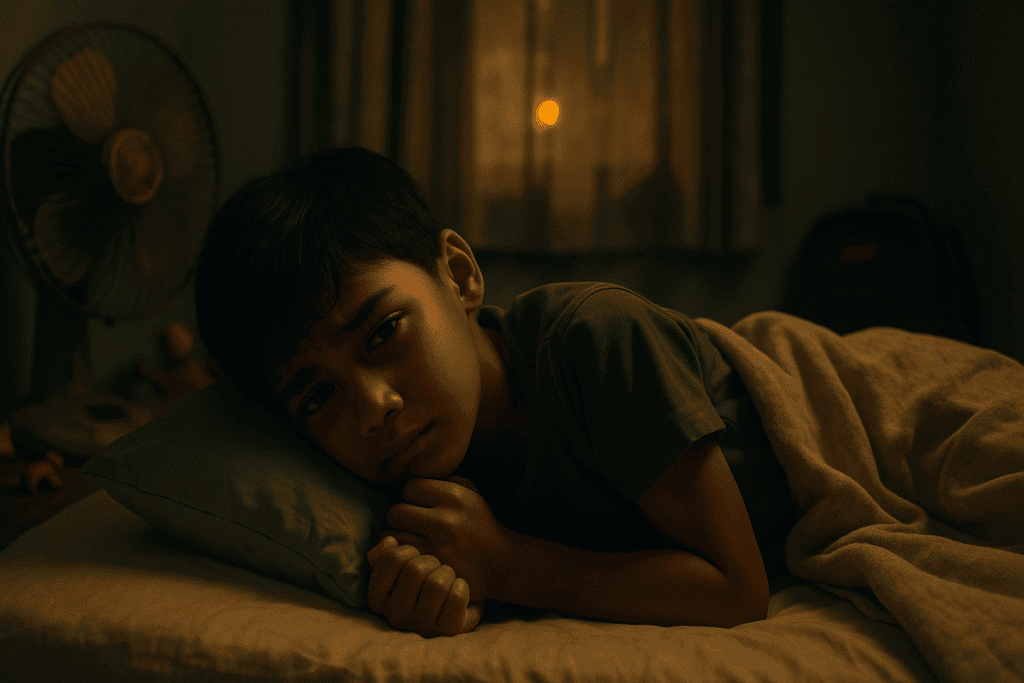
He was never a problem — except when something slipped. At school, seldom his emotions exploded out in small, scattered ways — a snapped pencil, a sharp tone, an outburst he couldn’t explain, like the time he pushed a boy smaller than him without knowing why.
And always, the fear: they might call his mother.
He stayed quiet when the other boys mocked him. He never fought back. His silence wasn’t weakness. It was loyalty. He knew her work mattered more than his sadness. So he tucked it away. He smiled when he needed to cry.
The tension inside him — tight, unnamed — came out as headaches. And the answer was always the same: A paracetamol and a glass of water. For what no one could see.
Two Stories, One Echo
Leonard had spent most of his life becoming someone others would approve of. He was raised in a home of quiet perfection — upper class, immaculate, where dinner was served on time and emotions were not.
Where image mattered more than truth, and feelings were managed like inherited silver: polished, but never used.
His parents lived what looked like a marriage. But it wasn’t love. There were just cold silences more than the fights, and the separate bedrooms.
His mother, elegant and guarded, had other lovers.
Leonard didn’t know who they were — only that they came and went like ghosts in the walls. She covered it all with a kind of suffocating affection toward him — smothering, confusing, and never freeing. One moment tender, the next bitter. One moment praising, and the next hostile, cruel.
Every single day, she’d tell him how atrocious his father was. She blamed him mostly for his drinking problem.
How selfish.
How cruel.
She would press her lips against his hair and whisper, “You’re the only one who loves me. I do all this for you, I endure this pain for you”.
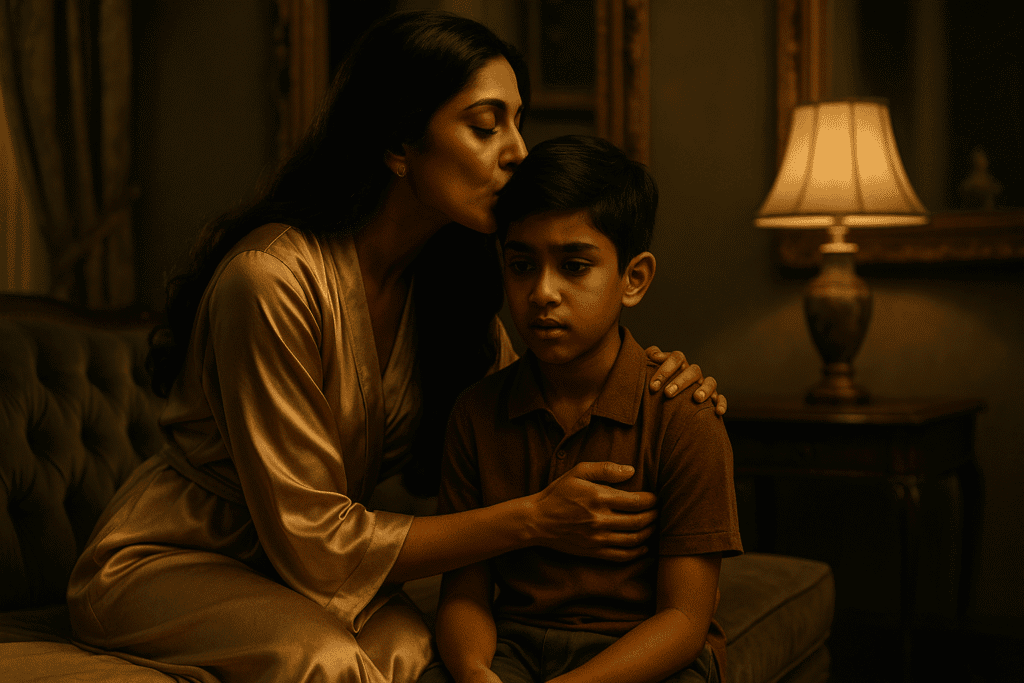
He believed his mother’s stories of blurred lines. As his father never looked him in the eye, as he never called his name. It was as if, to his father, Leonard didn’t exist.
The agony he felt inside – he didn’t know what it was. There were nights he sat in the kitchen, small hands clenched around the table edge, so overwhelmed by confusion and rage that he imagined grabbing the knife and slicing through his father’s chest — not because he hated him, but because he thought it might end the suffering of his mother.
Some kind of a salvation. From whom he did not know. For who he did not know.
Not until much later did he wonder: Had his father truly disliked him? Or had his mother painted him into a monster?
He knew love only from the movies — and he thought it was too good to be true.
There were moments of real longing. He remembers being thirteen, sitting next to a boy in music class, so close their elbows touched. His heart had pounded, but he said nothing. There was no map for what he felt. No word for it. No place for it to go.
Just like Songkran, he had no example. No experience of secure love. No language that felt safe in his lips.
So he tucked it away. He became well-mannered. Brilliant. Controlled. And somewhere along the way, frozen. There were lovers. Yes. But they were fleeting. Private. Carefully timed. No one was ever enough to touch the part of him that remained untouched.
Until Songkran.
The Wound That Recognized Itself
They met at a university art exhibition tucked behind a Bangkok side street. Humid air, glasses of cheap wine, too many paintings trying to say too much. Neither of them really wanted to be there.
Leonard was accompanying a friend, an art collector. He lingered near a piece that made no sense, staring not at the art, but into it — the way someone stares just to avoid being seen. He asked himself “What am I doing here?”.
It was Songkran’s sophomore year at the university. He arrived late, walking in with a friend whose artwork was on display. But quickly drifted off. Maybe to escape the noise. Maybe to find air.
And then, across the room, their eyes met. And then, their eyes locked, quietly and completely.
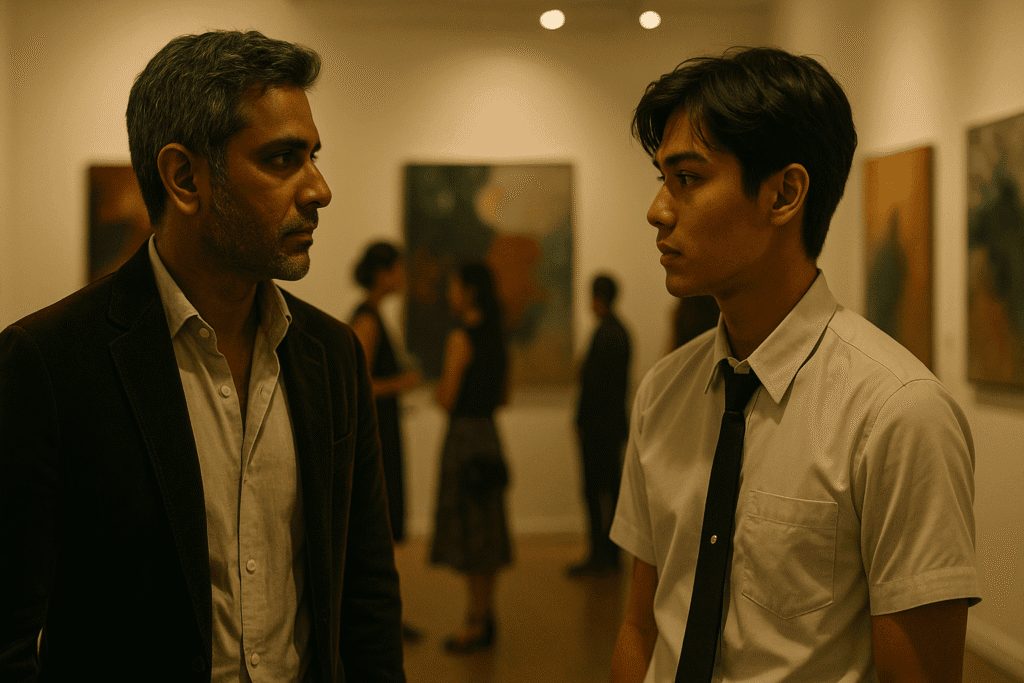
Songkran’s eyes widened. His heart skipped a beat. There was a lightning inside him, and it poured through his entire being. He had no conscious control. He simply gave into the magic of his gaze — comfortable, natural, effortless.
Leonard’s inner experience was different. He felt the pull so strongly in the magic of Songkran’s gaze. He wanted to look away. He truly tried. But he simply couldn’t. As if the entire universe disappeared. As if the expressive eyes staring back at him took complete control over him.
They had no label for it.
No idea what was happening.
It was just happening.
It was like meeting someone you always knew, always meant to meet, just appeared before your very eyes – and there they were. Finally!
It was simple. Irrevocable.
Looking for an Equilibrium: The Slow Circling of the Wounded
They gravitated. They circled. Slowly. Like the moon leaning into the earth, held in delicate balance. And the celestial bodies surrendering to each other. It wasn’t a push and pull — it was a quiet, magnificent harmony.
Long conversations weren’t needed. Shared glances across the room. Evenings where they sat beside each other in silence — not because they lacked words, but because neither wanted to interrupt what felt like a miracle.
And when Songkran met him, it wasn’t that Leonard tried to fix anything. He didn’t offer answers. He didn’t fill the silence. But when Leonard looked into Songkran’s eyes, he knew — instantly.
Like someone who recognized the architecture of longing.
Like someone who had walked through that same house, room by room, and knew exactly where it hurt.
And somehow, in the quiet corners of his body, Leonard had made a home — no effort was needed.
Our nervous systems are constantly scanning for cues of safety or danger — a function called neuroception, discovered by Dr. Stephen Porges through Polyvagal Theory. What Songkran and Leonard experienced in each other was not just attraction — it was regulation. Their bodies sensed, “I’m safe with you,” even before they had words for why.
People with trauma histories often develop hypervigilance, emotional suppression, or a need to perform for love. When they meet someone who simply is, and allows them to be, something profound can happen: The nervous system begins to downregulate. The body begins to unlearn the reflex
This phenomenon is known as co-regulation — when two people unconsciously soothe each other’s nervous systems simply by being in attuned presence. It is the foundation of secure attachment and one of the most powerful forms of nonverbal healing.
This happens when two nervous systems begin to find rhythm together. Not through logic, but through safety. Not by solving, but by simply holding space.
- Have you ever met someone who made your body feel calm, before your mind had caught up?
- Do you remember a moment where silence with someone felt more healing than words?
- Can you recognize the difference between someone who fills space, and someone who holds it?
When the Presence of Love Heals the Wounds Time Forgot
They had no awareness — no language — for what they carried inside. The shadows of childhood showed up quietly — as betrayal, disappointment, heartache that came and went like weather.
But when they met, something unexpected happened.
Healing.
And it didn’t arrive with dramatic breakthroughs. For them, it came in morning teacups. In laundry folded without being asked. In the way they walked beside each other without needing to speak.
Songkran held back — not because he didn’t feel, but because he was afraid that if he named it, it would vanish. He had spent his whole life training himself to smile while a storm brewed inside. He knew how to cry alone. In Leonard’s presence, he smiled. He stayed calm.
And Leonard — every time the feeling in his heart began to grow, every time he thought of Songkran and felt joy, a part of him recoiled. It felt too good to be true. Like something from the movies.
Without knowing why, he braced for betrayal, anticipated chaos. He didn’t connect the dots — but it was a ghost from the past, the shadow of his mother’s love. Leonard appeared composed, but inside, his body felt he held his breath. He wanted to run.
But, more times than he could remember, just as he reached for his phone to write to Songkran, a message from Songkran popped up saying “Have you eaten yet?”.
It was unexplainable. But it was real.
There were no games. No rules. But there were shadows — ones neither of them could yet name. They didn’t know what it was. But their nervous systems did.
And somehow, the space between them softened those aches they carried silently — without needing to explain them. Because sometimes, the body begins to trust
before the mind can catch up.
Attachment theory helps us understand why their love felt so powerful — and yet so terrifying. Songkran carried the imprints of an anxious-preoccupied attachment: the fear of being too much, the dread of being left, the instinct to cling silently while smiling through the ache.
Leonard, on the other hand, bore the signs of an avoidant-ambivalent attachment: the longing for closeness intertwined with the fear of suffocation, the appearance of calm concealing a history of emotional enmeshment and betrayal.
Their connection awakened something known as limbic resonance — the emotional attunement that occurs when two brains synchronize, often below the threshold of conscious awareness.
It’s how infants bond with caregivers before they have language, and how adults still seek that same resonance in intimacy.
Their wounds were old. But the healing was real. Not through therapy. Not through insight.
But through implicit memory — the kind the body stores when it learns, “This is what safety feels like.”
They weren’t healing each other’s trauma. They were helping each other feel safe enough to unlearn it. Not by force. But through presence. Through availability. Through rhythm.
This is what earned secure attachment can look like: When two people, even with wounded histories, begin to build trust not through promises, but through consistent emotional presence.
- Have you ever noticed yourself pulling closer in fear that someone might leave — or pulling away just when someone gets too close?
- Can you remember a moment when your body softened in someone’s presence — even if your mind still braced for impact?
- Have you ever noticed the ache of losing them felt stronger than the joy of having them?
Why It Felt So Precious — Like a Match Written in the Quiet Language of the Soul
For Songkran, Leonard felt like something he had been waiting for his whole life without knowing it. A fatherly figure. Not a fantasy — but the strong presence of a masculine figure. Someone who didn’t just see him — but placed him in his eyes like something sacred. Someone who cared so deeply, someone he never knew he needed.
A love that said: “Go out into the hostile world if you must, and when you’re tired or afraid, fall back — I am here for you”.
And for the first time, he started to experience it, a glimpse of what it might’ve felt like to have a loving father. And in Leonard, he felt that grounding. That steadiness. That “I am here, whenever.”
And for Leonard — Songkran wasn’t just a delicate young companion. He stirred something deep within him: the boy Leonard had long ago buried — the abandoned one. The boy who had been made the scapegoat. The boy who was told too much, too soon. The boy who learned to stay composed when all he really needed was to be held — not held as a shield against someone else’s agenda, but truly held and seen, out of love and care.
Through Songkran, Leonard began to care for the boy once had been abandoned & betrayed — the quiet child still waiting inside him, waiting to be heard and seen. Each time he showed up for Songkran with tenderness, with patience, with unwavering care, he was, unknowingly, showing up for himself.
The very things he had longed for as a child — to be held without expectation, to be chosen without condition — he now offered unconditionally to Songkran. And in doing so, something in him began to heal — spontaneously, without him even realizing he needed it.
His love for Songkran wasn’t transactional. It wasn’t obligation. It wasn’t compensation. It was devotion — gentle, grounded, and real.
Because in loving Songkran, he was also loving the parts of himself that yearned for love. He was becoming the adult he once prayed would show up. The caregiver he had needed — finally arriving, through his own presence. And somehow, through his love for Songkran, the boy inside him was no longer alone.
It felt sacred. Not because it was perfect — but because it was whole.
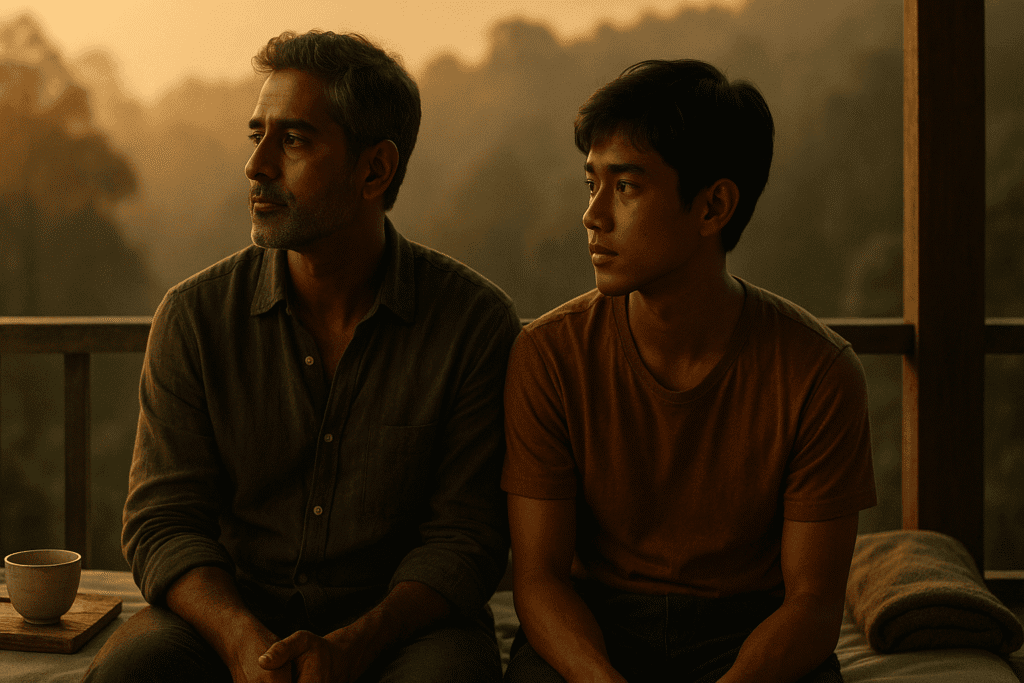
When two people enter a relationship with unresolved wounds, the bond can either retrigger old pain or become the very space where those wounds begin to soften. This is especially true when one begins to offer the kind of care they never received — not just to the other, but to themselves through the act of love.
Psychologists refer to this as “inner child healing” — a process where unmet emotional needs from childhood are addressed in the present through conscious nurturing, re-parenting, and emotionally safe relationships. Dr. John Bradshaw, one of the pioneers of inner child work, emphasized that these forgotten parts of ourselves — often exiled by trauma or shame — can be recovered, not by revisiting the past alone, but by creating new emotional experiences in the present.
Leonard’s ability to care for Songkran, and Songkran’s ability to receive it, became a corrective emotional experience — a kind of emotional re-scripting. In psychological terms, this is how earned secure attachment can begin to form: through repeated, consistent experiences where love becomes safe, dependable, and real.
This isn’t about depending on a partner to “fix” the past — but about how co-regulation, emotional presence, and healthy intimacy can make it possible for the nervous system to relax, trust, and reorganize.
And that is what healing often looks like — not dramatic breakthroughs, but quiet, repeated moments where the body learns: “This time, it’s different.”
Together, Songkran and Lonard created a rhythm neither had ever known —but both had always longed for. They weren’t just falling in love. They were becoming a refuge for the parts of themselves that had never felt safe..
- Have you ever caught yourself loving someone in the way you always wished to be loved?
- Is there a part of you — younger, softer, perhaps hidden — that still longs to be seen, held, or protected?
- Can you imagine becoming a safe place — not just for someone else, but for the younger version of yourself?
We began this with a question: “Why do we fall in love with the wound?”
And perhaps the answer is this: “Because sometimes, when two wounded hearts meet, they don’t just fall in love — they find refuge in each other, and the courage to rewrite the very story that once broke them.”
If this story reminded you of someone you know — consider sharing it with them. Someone who may also need to remember themselves — to remember that they are worthy of love. Someone who’s afraid to fall in love — not because they don’t want it, but because it touches too closely the place where they were once hurt. Or someone who’s searching for love, not realizing it may already be quietly standing in front of them.
And if these words stirred something in you — something tender, perhaps long forgotten — I’d love to hear your reflection. Feel free to share your thoughts in the comments below.
Sometimes, your voice is the very thing someone else needs to hear to begin their own return.
References
- Bowlby, J. (1988). A secure base: Parent-child attachment and healthy human development. New York: Basic Books.
- Bradshaw, J. (1990). Homecoming: Reclaiming and championing your inner child. New York: Bantam.
- Cozolino, L. (2014). The neuroscience of human relationships: Attachment and the developing social brain. 2nd ed. New York: W.W. Norton & Company.
- Levine, P.A. (1997). Waking the tiger: Healing trauma. Berkeley, CA: North Atlantic Books.
- Porges, S.W. (2011). The polyvagal theory: Neurophysiological foundations of emotions, attachment, communication, and self-regulation. New York: W.W. Norton & Company.
- Schore, A.N. (2003). Affect dysregulation and disorders of the self. New York: W.W. Norton & Company.Umeå University
- Siegel, D.J. (2012). The developing mind: How relationships and the brain interact to shape who we are. 2nd ed. New York: Guilford Press.
- Van der Kolk, B.A. (2014). The body keeps the score: Brain, mind, and body in the healing of trauma. New York: Viking.

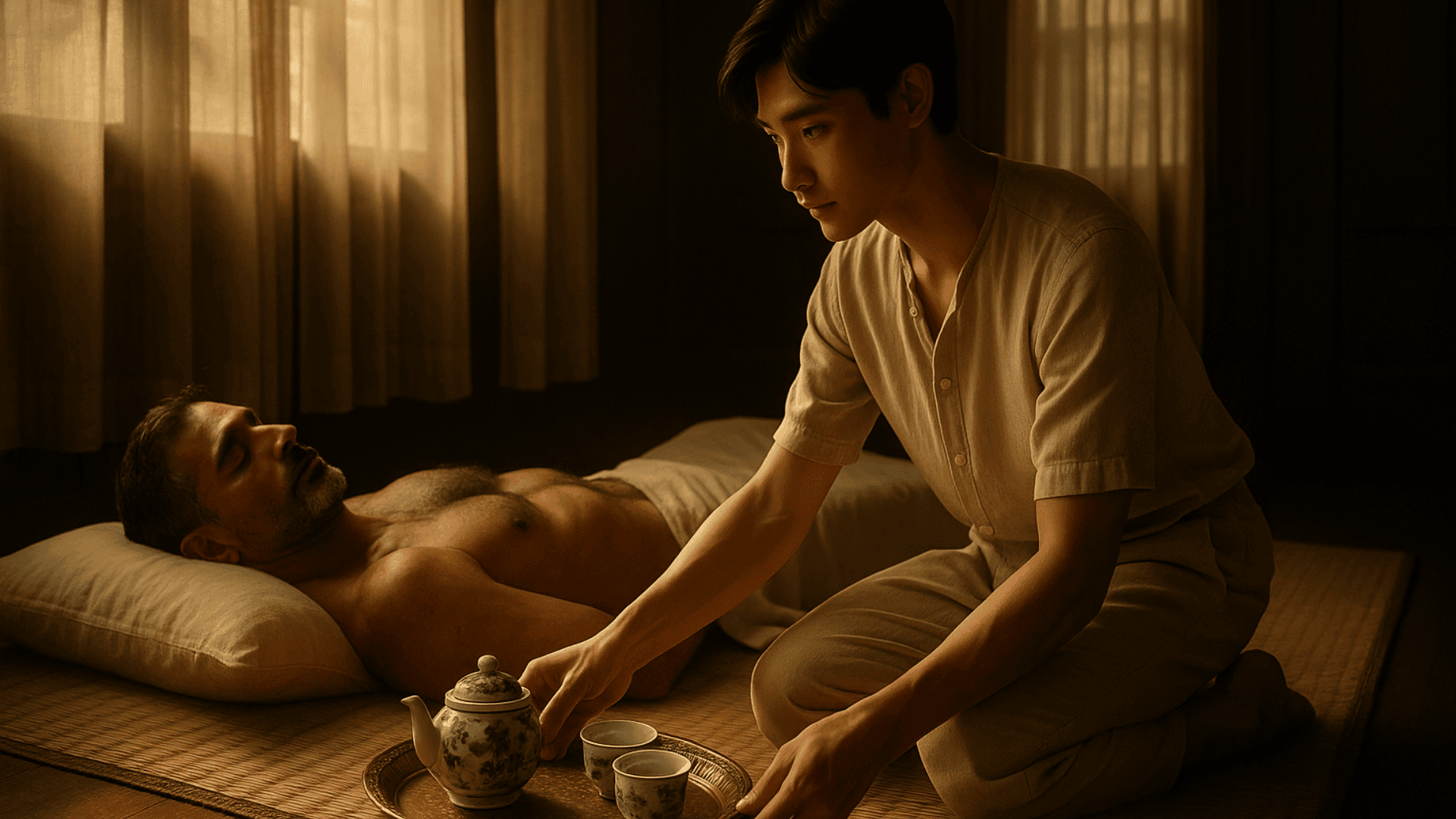



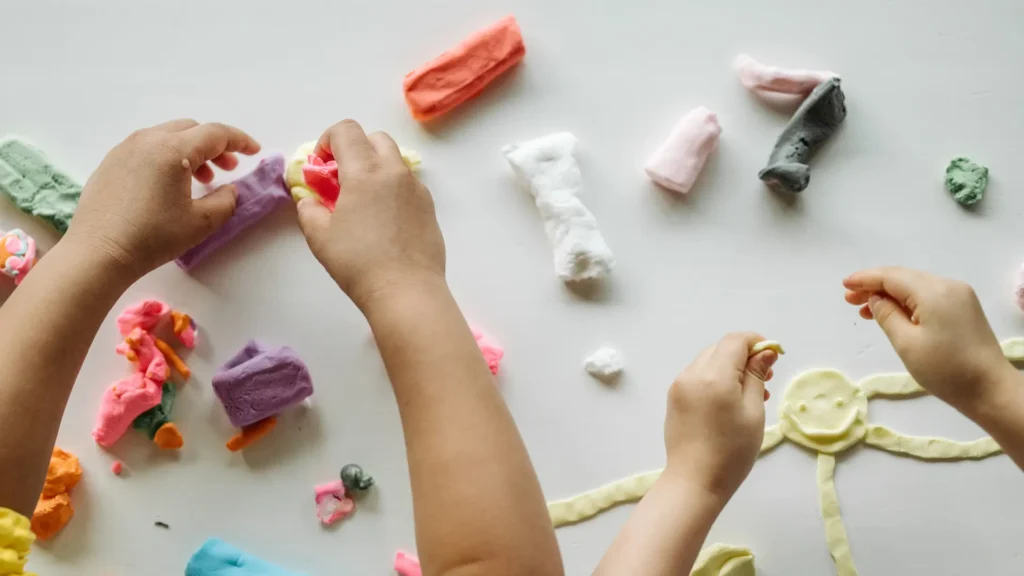
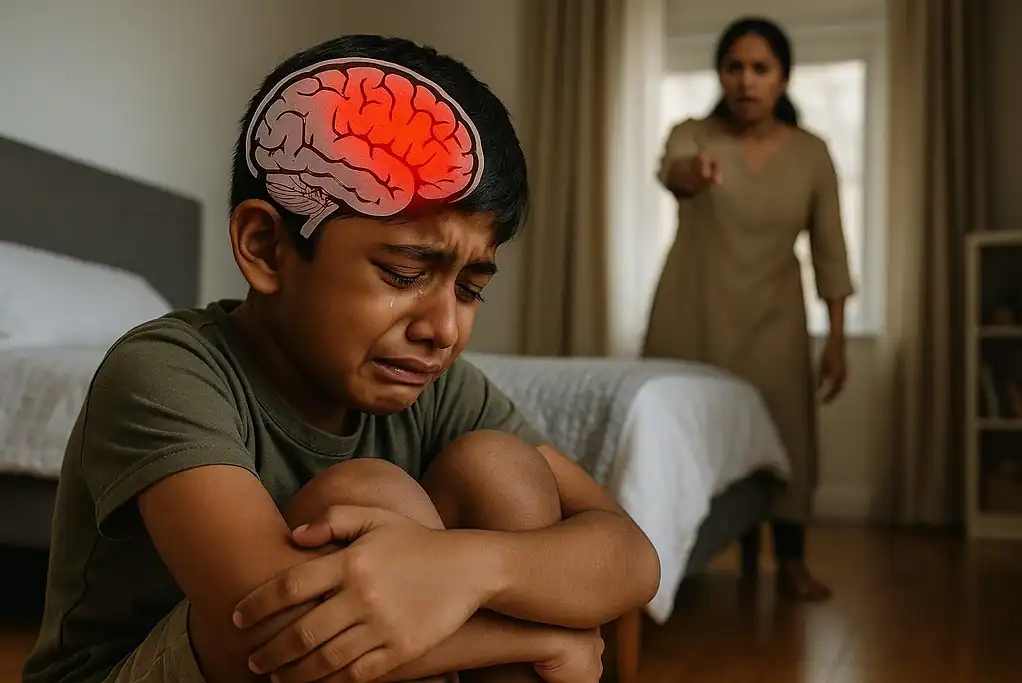

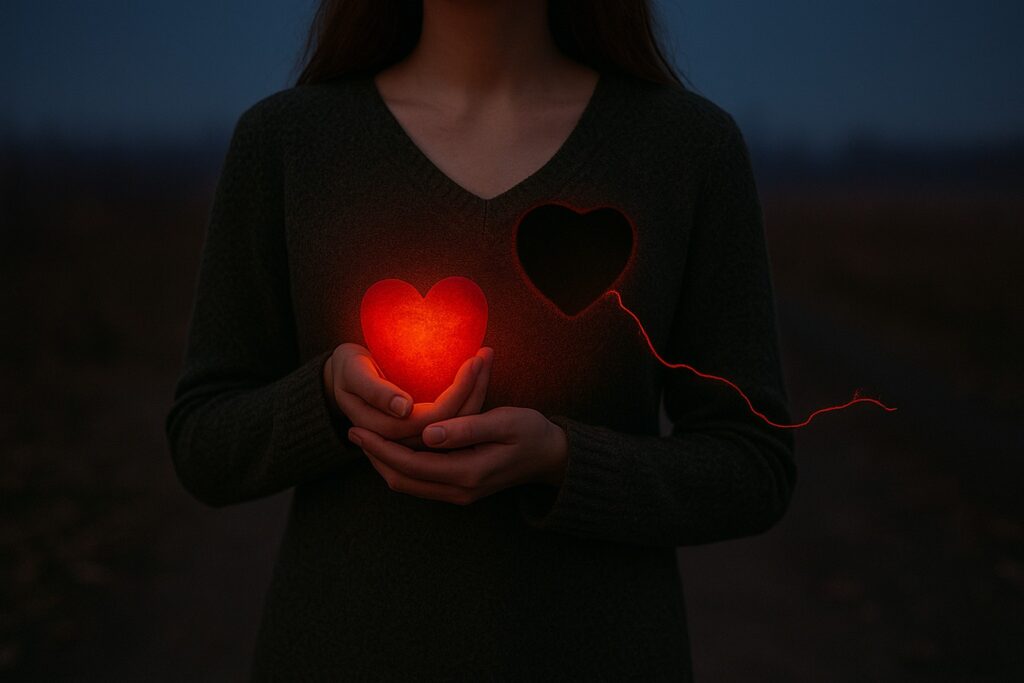

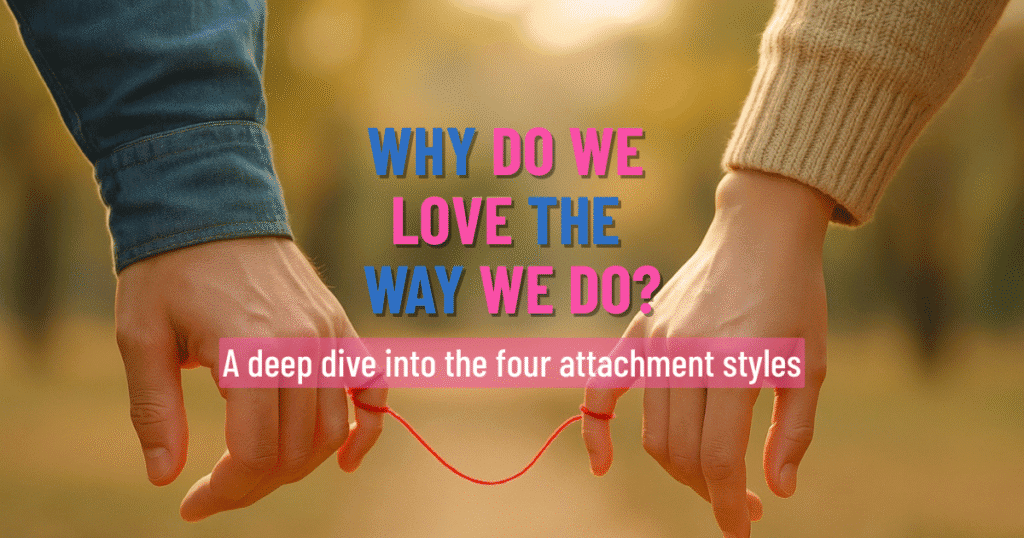
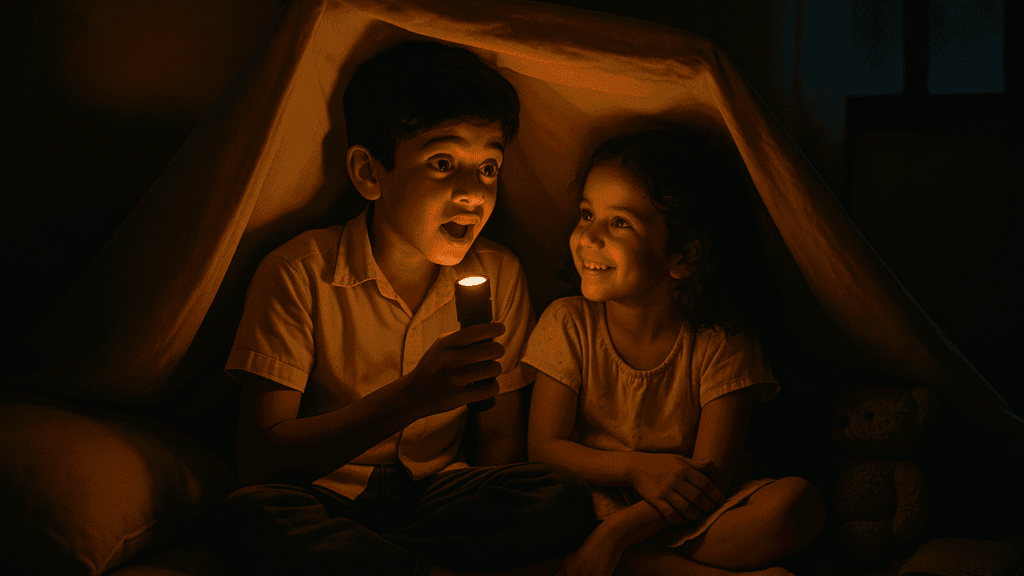

This was so beautiful. Thank you for sharing it.
Thank you Helen. I believe that what we reflect outward is what is within us. So, I think it’s your inner beauty that you recognized in these words. Thank you for the encouragement, which I deeply value and it gives me the courage to continue to write. Gratitude.
This feels exactly like my current relationship with my fiancée. Thank you so much for sharing this story!
Thank you Jessica for stopping by. I am so happy to hear that you have a partner who provides you space, care and healing. Sending you my best energy.